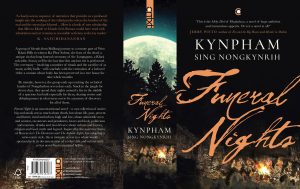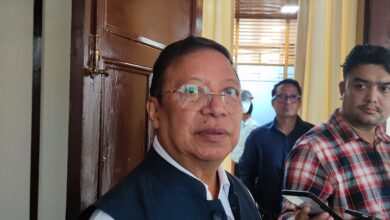A poet’s journey
It was the desire to tell the true story of Khasis that prompted poet Kynpham Sing Nongkynrih to write Funeral Nights, his debut novel focusing on the tribe’s history, origin, spiritual roots, traditional democracy, political culture & social maladies

A death, a congregation and a hundred stories to warm the heart around the hearth. Listen intently and you will be transported to another world, defined by simplicity and deep-rooted tradition and culture. These anecdotes of life commingle with Kynpham Sing Nongkynrih’s poetic thoughts to portray a tribal society that has been misrepresented on several occasions. Funeral Nights, the poet’s debut novel that is scheduled to be released in July, is a reflection of the Khasi culture, its maladies and the author’s social belonging. The work of fiction is both “instructive and delightful”.
The poet-turned-novelist says the book, which is among the most anticipated literary works so far this year, not only speaks about the tribe and its history but also discusses the innate problems afflicting the society for decades now. “It will be controversial,” he predicts.
A group of curious intellectuals sets out for a jungle village of the Lingam, a Khasi subtribe, to witness the unique funerary rituals. But their infernal quest is hindered, and instead, they discover new dimensions of a lesser-known society. While their days are spent on discovering the countryside, their nights are occupied with deliberations on various inherent socio-political issues.
Like Nongkynrih’s other literary works, this book too is greatly influenced by his early life in Sohra. “The book is all about the Khasi people, their history, origin, spiritual roots, political culture, traditional democracy, social system, funerary practices… all are there in the form of stories,” says the author.
But is it too late for the magnum opus? Nongkynrih disagrees. “Nothing like this is too late. Most of the Khasis today don’t know about their roots. Most of us are forgetting the language too. I hope that this book will make people think about these things,” he says.
In an interview with Sunday Monitor, Nongkynrih shares his journey as a novelist, his attachment to Sohra, inspirations and his devotion to poetry. Excerpts:
The book
The magnum opus is a collection of several stories and characters which talk about the quintessential Khasi society. The author says he collected most of the stories from his childhood and some from those narrated by his friends and colleagues. There are stories about identity, culture and legality.
I have always wanted to write about Khasis. I have noticed that people, journalists, writers, fly-by night operators come here and write all sorts of nonsense. For instance, one article describes Khasi men as “breeding bulls”. We have also been described as “red-mouthed demons”. This kind of abuse has been going on since the time of Welsh missionaries and you do not like reading such things. I always felt that I should write something to present the true story of the Khasi form of life and the tribal society. But I didn’t want to write an essay or a non-fiction piece. I wanted to write something that would be more instructive and delightful. So, I was looking around for a narrative frame. Then I thought about the Khasi funeral nights.
In Khasi funerals, bodies are kept for two nights. People come from faraway places to condole. They spend most of the night in the house of the dead, sharing stories and many interesting anecdotes. But this is only a part of the narrative frame and not the complete story.
While I was searching for a narrative frame, I remembered Giovanni Boccaccio’s The Decameron. The book tells the tale of a group of friends who left the city to escape plague. It was then that I came to know about this unique funeral tradition of the Lingam, a Khasi subtribe. Before cremating the body of a woman, the villagers kept it in a treehouse for more than nine months. I began thinking about the plot. In my novel, a few intellectuals, about 11 of them, travel to the faraway village to witness this funeral tradition. The rituals are supposed to last for six days but the group makes a mistake about the date. So, they get stuck in a jungle for 15 days. The local people are generous enough to construct a hut for them with a small fire in the middle. They spend days exploring the jungle but at night, they mostly share stories and debate on issues. That was my journey from poetry to writing a novel.
In 2008, when I was thinking about writing the book, Karthika (Karthika VK, who was then the CEO of HarperCollins), encouraged me. I started researching for the book and travelled to a Lingam village and explored the area. I read extensively about the subtribe as well as the entire Khasi tribe. The Lingams’ funeral tradition, which is quite elaborate, occupies only 40 pages of the 1,022-page book.
The research took a long time. After that, I barely got time to start the novel. In 2016, I finally took sabbatical and busied myself in writing the book. Initially, it was a 1,600-page manuscript. So, the editing process too took a long time. I submitted the manuscript to HarperCollins, Penguin and Westland and all accepted it. However, I chose to connect with Westland as Karthika was the publisher then. It was she who enthused me in writing the book and had promised to edit my book and bring out a Kindle edition. Funeral Nights would have been released in 2019 had it not been for the pandemic.
I would love to have a translation of the book. But Khasis are not very good readers, so I am not sure… Let us see what the reaction is to the original.
 The controversy
The controversy
Nongkynrih predicts that the book, once released, will create a flutter as it focuses on controversial topics.
The characters take up a lot of controversial issues for debate. Among Khasis, we have serious issues as a society. A great divide exists between the Khasis and the Jaintias. The Pnar prefer to call themselves Jaintias and do not consider themselves as Khasis. Another divide is between the Khasi Christians and practitioners of the traditional religion. There is a heated debate in the society and the same is reflected in the book. The men talk about corruption and influx and how influx is bad for both Khasis and non-Khasis in the state. Influx is related to other ugly issues like communal riots… It will be quite controversial.
Prof K Satchidanandan describes the novel as “a rare book of learning”, and at the same time, says that it is accessible as a work of fiction. While the characters are rooted to the land, they also have a universal appeal.
The poet
I have not really escaped from poetry and not that I want to. There is a lot of poetry in the book.
I almost consider myself as a poet. Even when I was writing the novel, I would yearn for poetry. However, I have the talent to write other forms of literature. So, why waste the talent? Also, I feel fulfilled by a work well done, be it poetry or prose.
I still make a point to read poetry before going to bed. Right now, I am reading Jaroslav Seifert (Czech Nobel laureate). I have also started listening to audio books recently. I have an eclectic reading taste and if the first few pages of a book fail to hold my attention, I stop reading.
Sohra in his heart
The distinctive tradition and culture of Sohra and its ethereal beauty have always mesmerised Nongkynrih and inspired many of his works. The novel is not an exception. The poet and author spent a few years of childhood in Sohra but his memories of the place are vivid. He is still enamoured of the place and its people and pines to go back to the roots.
Sohra has been everything to me. I think it represents the happiest time of my life. If there is anything like paradise in this life, that would be my childhood in Sohra. I would dream about it again and again. It was like an escape for me when I would see and experience all sorts of things in the city.
My mother was in the health department and was transferred to Laitlyngkot. After Class IV, I had to leave Sohra. We stayed in Laitlyngkot for about two years. I completed Class VI from a school there that doubled as an animal shelter at night. Sometimes, we had to sweep the floor before the class began. I wanted to go back to Sohra Ramakrishna Mission.
But I got a scholarship and I was told to come and study in Government Boys’ High School in Shillong for a bigger amount. I shifted to Shillong and stayed in a hostel. After that, my family came to live here. I did not really like the experience. I didn’t like the attitude of landladies and landlords towards tenants and that kind of behaviour affects you almost permanently.
My first poems were about Sohra. In fact, the narrator in the first chapter of the novel begins by introducing himself but ends up introducing Sohra. Forty per cent of the stories in the book are based in Sohra. It is in my blood, a place for final repose I believe.
The mighty pen
Nongkynrih rejects the claim that an individual’s silence on media and social media platforms proves his or her disconnect with issues afflicting the society. For him, creative medium is the way to speak up against injustice. His poems and proses are indicative of this belief.
I don’t really engage in the media, especially the print media. When you write something in the media, for instance in a newspaper, then there are reactions, some of which are sensible but others are just silly. And then you have to react to the reactions. But where do I have the time to do that? Others who have a lot of time can do. I would rather write poetry and short stories and novels whose shelf life is more than a newspaper article. There are many like me and just because we are not visible in print or on social media, it does not mean that we do not care. I take up these issues in my writing.
One of the important issues is the question of origin. This too I have taken up in my writing… If I write a book, it will stay forever, whether people like it or not. I don’t want to waste time quarrelling.
Literature of the region
Nongkynrih says many literary works are done in the northeastern states but they remain under-represented. He also feels that the inclusion of Khasi in the Eighth Schedule to the Constitution will help the language grow in various ways.
Many works are being done in the North East but many are not visible because of paucity of translation. Though more translations are happening today, they remain under-represented. Those who write in English are more visible.
I can speak about Khasi literature. There have been many translations from English to Khasi, but unfortunately, not many translations have been done from Khasi to English. This is a strange phenomenon. In fact, U Soso Tham’s works have not been translated in a befitting manner. The problem is that we translate better from English. One needs to be bilingual, but now, we see people know, or pretend to know, more English. Many educated Khasis do not consider books written in their mother tongue as real books. So they read English books and newspapers. This attitude needs to change. The educated should become well-versed in Khasi too.
Also, the delay in the inclusion of the language in the Eighth Schedule is affecting its growth in a way. Once that happens, it would automatically be included in Sahitya Akademi. With this, awards and aid will come, along with other benefits. This will encourage further studies, research and writing. However, many people are contributing to the development of the language by writing poems, novels and plays in Khasi.
Having said that, I would like to mention that inclusion of the language in the Eighth Schedule is no more a matter of literature. It has become a political issue. Languages much less developed than Khasi have been included. It is unfortunate.
Literary influences
In Sohra and Laitlyngkot, I would mostly read Khasi books and Khasi translations of Greek mythology, stories about myths and legends. But when I came to Shillong, I started reading novels. The first novel was by Louis L’Amour. I became an ardent fan. Then I started borrowing books from libraries, most of which are gone now. It was only later in college that I started reading poetry. I was greatly influenced by poets from East Europe, Latin America, Africa and the Middle East. When I started writing, I read the works of Indian poets too. I have many favourites among them. Pablo Neruda, Tudor Arghezi, Mahmoud Darwish are among the many who influenced me. I also read a lot of Japanese, Chinese and Korean poetry. In fact, one of my books is on Haiku.
The pandemic
Last year, during the pandemic-induced lockdown, I was editing my book. However, a strange thing happened. I read Dante’s La Vita Nuova. I was inspired by his spiritual love for Beatrice. I started writing a versed romance. The collection is called Nameri. It is a single poem comprising 208 short verses. It is about love, ruminations about the pandemic, philosophical issues involving time, space and human relations. The book is complete, and currently, I am in talks with publishers. Let’s see.
~ Team Sunday Monitor




